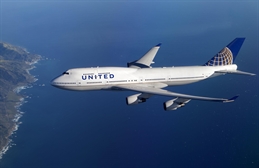
United Airlines has launched its Eco-Skies Alliance program, an effort to reduce the aviation-related impact on the environment through the collective purchase of approximately 3.4 million gallons of sustainable aviation fuel (SAF) this year.
In a statement, it said more than a dozen companies including shippers and freight forwarders have joined the initiative with the initial SAF enough to eliminate approximately 31,000 metric tons of greenhouse gas emissions, or enough to fly passengers over 220 million miles.
SAF has nearly 80% emissions reductions on a lifecycle basis compared to conventional jet fuel.
The inaugural participants of the program, according to United are moving to reducing their aviation-related impact on the environment at the source and creating demand for more SAF production.
These companies include Autodesk, Boston Consulting Group, CEVA Logistics, Deloitte, DHL Global Forwarding, DSV Panalpina, HP Inc., Nike, Palantir, Siemens, and Takeda Pharmaceuticals.
"While we've partnered with companies for years to help them offset their flight emissions, we applaud those participating in the Eco-Skies Alliance for recognizing the need to go beyond carbon offsets and support SAF-powered flying, which will lead to more affordable supply and ultimately, lower emissions," said United CEO Scott Kirby.
"This is just the beginning. Our goal is to add more companies to the Eco-Skies Alliance program, purchase more SAF and work across industries to find other innovative paths towards decarbonization."
United has made the airline industry's single largest investment in SAF and has purchased more SAF than any other airline in the world. World Energy, a long-term partner of United, will supply the SAF to Los Angeles International Airport (LAX), which makes it conveniently accessible to United's operations.
United earlier committed to become 100% green and reduce our greenhouse gas emissions 100% by 2050 by taking the harder, better path of reducing emissions from flying, rather than relying on traditional carbon offsets.



